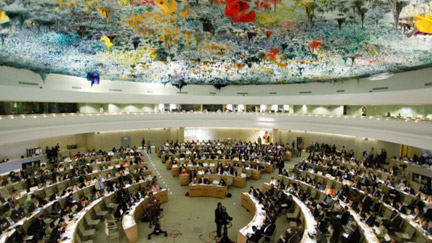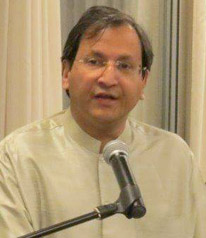|
Opinion:
Sinister elements try their best to discredit Government
By K.M.H.C.B. Kulatunga
Needless to say the LTTE rump, certain INGOs and a handful of Western
politicians are making a big effort for a regime change in Sri Lanka.
From the day the news of an early presidential election was predicted in
the media, the coffers of certain NGOs have been overflowing.
 |
|
The UNHCR in session (file
photo) |
Having failed to challenge the strong Sri Lanka leadership which has
maintained a clear cut foreign policy, giving utmost importance to the
country's sovereignty and territorial integrity, these sinister elements
have made every effort to discredit the Government in the eyes of the
international community.
Even after the change of leadership, the United Nations Human Rights
Council (UNHRC) has continued to adopt the same stance against Sri Lanka
for obvious reasons. It is pity that the UNHRC continues to be a
platform for the stronger nations in the West to intimidate and meddle
in internal matters of smaller nations in the guise of protecting human
rights. At the same time, the UNHRC appears to be a toothless tiger
against the gross human rights violations of the US-led NATO forces in
Iraq and Afghanistan.
Statement
Unfortunately, some of the local opportunistic and racial politicians
in the Opposition too have joined the bandwagon to fulfill the goals of
the LTTE rump and some Western politicians.
|

Sri Lanka’s Permanent Representative to the UN in Geneva
Ravinatha Aryasinha |
A day after the UN Office of the High Commissioner for Human Rights (OHCHR)
issued a statement berating Sri Lanka and unfairly accusing the country
of obstructing investigations, Chief Minister of the Northern Province,
C.V. Wigneshwaran made a similar statement. Wigneshwaran and his Tamil
National Alliance (TNA) cohorts were in cahoots with those who
distributed blank forms to be signed at the bottom, promising financial
inducements to the signatories. The forms were to be filled later with
concocted war crimes charges.
The TNA connection to the plot became crystal clear after what
Wigneshwaran had said in Chennai - that the Government was arresting and
intimidating those collecting evidence for the international
investigation into its actions as it's "primary aim was to let no
evidence leave the shores.'
This well calculated charge was aimed at the Government with renewed
vigour since the TNA has been implicated squarely in the blank forms
fiasco.
Crucial time
Delivering a lecture organised by People's Union of Civil Liberties (PUCL)
in Chennai, Wigneshwaran contended that the Lankan executive was
'emboldened by the series of decisions made by the Supreme Court in
supporting bills and constitutional amendments and holding with the
executive in the fundamental rights' cases.' He made many more charges
amounting to contempt of court.
The NPC Chief Minister's remark comes at a crucial time when the
Government has categorically rejected the investigation established by
the UNHRC is not tantamount to concealing information. The Government
has steadfastly maintained that it owes to the country's dignity not to
subject its people to an investigation that does not conform to even the
minimum requisites of justice and fair play. This position has been
overwhelmingly endorsed by the Parliament.
It is a principled position which the Government chose to take that
was supported by many countries in the Council, according to Sri Lanka's
Permanent Representative to the UN in Geneva Ravinatha Aryasinha.
Sovereign nation
In a hard-hitting response to UN High Commissioner for Human Rights
Prince Zeid Ra'adf Al Hussein, Ambassador Aryasinghe has said that the
contents of the news UNHRC release undoubtedly confirms the double
standards being applied by the OHCHR vis-a-vis Sri Lanka.
"This type of action on your part would regrettably constrain
constructive engagement which the Government of Sri Lanka has
consistently sought to pursue," he was quoted as saying.
It is regrettable that a news release should have been issued on this
matter attributed personally to the UNHRC questioning the integrity of a
government of a sovereign nation which has been a member of the United
Nations since 1955. Sri Lanka has contributed consistently to the United
Nations system in numerous capacities by taking a lead in norm setting
processes including the Law of the Sea Conference, disarmament and human
rights.
Hence, it is unfortunate that the UNHRC news release has been issued
without making any attempt to understand the context or content apparent
from the media release of the Ministry of External Affairs dated
November 5, 2014. In fact, the OHCHR has been inept in comprehending for
reasons best known to it that the thrust of the concerns expressed by
the government of Sri Lanka related to the flawed procedure of the OHCHR
Investigation on Sri Lanka (OISL).
The government of Sri Lanka, its departments and agencies made no
attempt whatsoever to prevent bona fide witnesses from submitting
information to the investigation team. Neither was any attempt made to
deter and intimidate individuals from submitting evidence. The
submissions that the Investigation would have received by now would
stand to prove this fact.
Meanwhile, the conduct of the OHCHR representatives in Sri Lanka too
has been highly questionable. The UN Office of the High Commissioner for
Human Rights (OHCHR) must answer the questions on whether it had
distributed forms along with offers of monetary compensation for
detailing war crimes charges against Sri Lanka or not.
War crimes
In his criticism of Sri Lanka and his statement that the Government
has obstructed the so called investigation he has at no point denied the
allegations that the OHCHR distributed forms with the promise of
monetary compensation for detailing war crimes charges against Sri
Lanka.
The UN Human Rights High Commissioner Zeid Ra'ad al-Hussein has
issued a strongly-worded response to two recent allegations made by the
Government - first, that the Panel investigating Sri Lanka (OISL) has
made available war crimes complaint-forms to prospective signatories in
the North and East; second, that the OHCHR and/or OISL had offered
monetary compensation for testimony about war crimes.
The High Commissioner, in the aforementioned response, says, inter
alia, "This continuing campaign of distortion and disinformation about
the investigation, as well as the insidious attempts to prevent possible
bonafide witnesses from submitting information to the investigating
team, is an affront to the United Nations Human Rights Council, which
mandated the investigation....Since the end of the conflict in 2009, Sri
Lanka has continued to obstruct any independent investigation despite
the persistent, compelling and widespread allegations that possible
serious international crimes were committed by both sides during the
conflict in Sri Lanka." The High Commissioner only needs to answer two
questions;
(1) Did the OHCHR or OISL at any time make available complaint forms
to prospective signatories in the North and East?
(2) Did the OHCHR or OISL at any time make arrangements for monetary
compensation to be paid for such signatures and/or testimony?
Answers
If the OHCHR or OISL did not do either of the aforesaid, the High
Commissioner is in the best position to say so. Unfortunately, nowhere
in his statement does he expressly deny the Government's allegations.
Instead, he accuses the Government of "distortion and disinformation,"
and "insidious attempts" against bona fide acts.
The UN High Commissioner on Human Rights must answer those questions
clearly and directly.
Based on the answers to these questions, the public is fully capable
of drawing the necessary inferences to decide whether the Government is
guilty of "distortion and disinformation," "insidious" tactics, and so
on, or whether in fact it is the OHCHR that is guilty of such things.
As Ambassador Aryasinha has said, Sri Lanka stands ready to share its
experience in comprehensive demining as a 'best practice' with countries
which are facing similar challenges. Noting that Sri Lanka's continuing
progress in demining has been achieved by telescoping what according to
some estimates was to take 15 - 20 years, into one of five - seven years
duration, he said this was not only a rewarding experience for our
people as they now move about freely across the country, but also a
positive lesson for other conflict affected countries, where nationally
owned and nationally driven programs could achieve their intended
purposes, if the necessary political commitment, resolve and pragmatic
vision is put in place".
Weapons
Aryasinha made these observations when he addressed the 16th Annual
Conference of the High Contracting Parties to Amended Protocol II on
Prohibitions or Restrictions on the use of Mines, Booby-Traps and other
Devices of the Convention on Certain Conventional Weapons (CCW) last
Wednesday at the Palais des Nations in Geneva.
The Convention on Certain Conventional Weapons came as a result of an
increased international realisation that the effects caused by certain
conventional weapons may be excessively injurious and indiscriminate.
The Convention and its Protocols together manifest a clear intention and
commitment of the Contracting Parties to address this challenge
effectively, through the adoption of national programs and measures.
The Government successfully embarked on an extremely difficult
challenge of demining an area of approximately 5,000 square kilometers
of land initially estimated to be contaminated with mines, out of which
approximately 2,064 square kilometers were confirmed as hazardous areas.
The scale of the problem Sri Lanka faced in demining can be clearly
seen from the number of mines and other devices unearthed and
neutralised during the demining process. Over 1,128,336 explosive
devices (1,712- anti tank, 615,669-anti personal and 510,955 UXOs) have
been recovered as at September 2014.
Seventy five percent of the demining work had been allocated to the
Sri Lanka Army, which was the largest single area assigned to any of the
parties involved in demining and included most of the densely mined
regions.
Out of the total confirmed hazardous area, 96.2% has already been
cleared and only 78.8 square kilometers of territory remains to be
cleared. It is expected that these areas too will be completely cleared
in the near future.
Thanks to the efficient and effective demining process and also to
the infrastructure development in the former terrorist battlefield, the
Government was able to resettle a total of 510,710 persons (153,837
families) out of nearly 767,748 IDPs (226,824 families), in the Northern
Province and 257,038 persons (72,987 families) in the Eastern Province.
While focusing on the operationalisation of the Amended Protocol II
and considering matters arising from the annual reports presented by
High Contracting Parties, it is imperative that special attention is
paid to the development of technologies which could protect civilians.
Similarly, it is important that concerted efforts be taken to create
greater awareness among the public about indiscriminate effects of
mines, booby traps and other devices. It may also be timely to look into
effective cooperation to ensure the well-being of victims in a more
coordinated manner.
The UNHRC should look into all these notable feats since the defeat
of terrorism and the efforts made by the Government to strengthen
national reconciliation.
|

